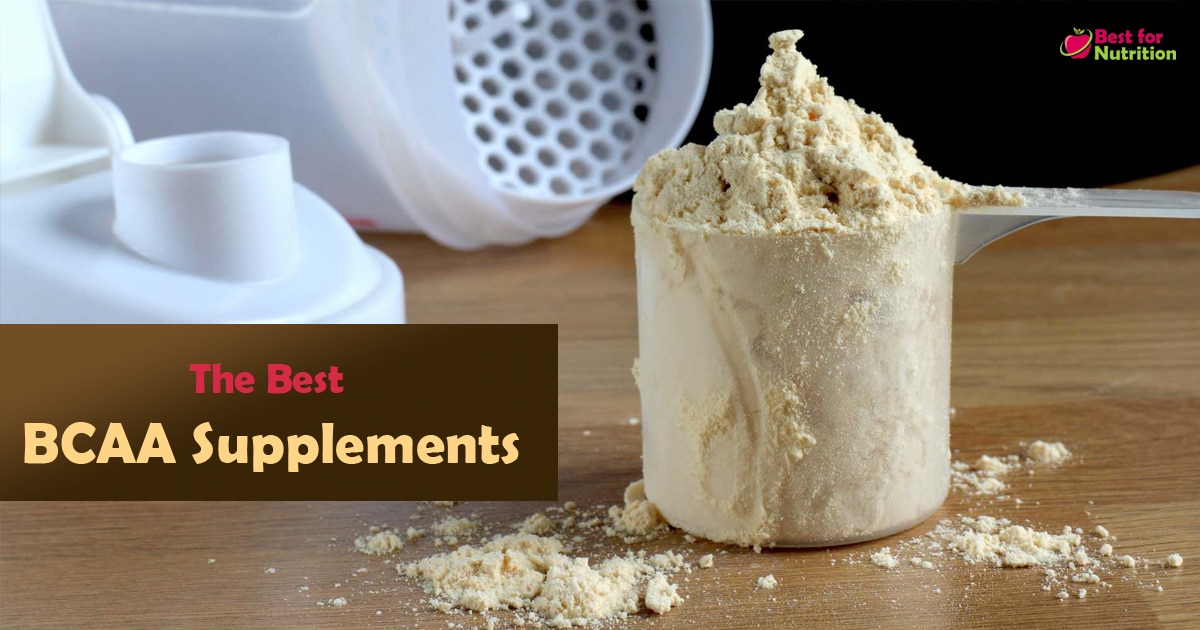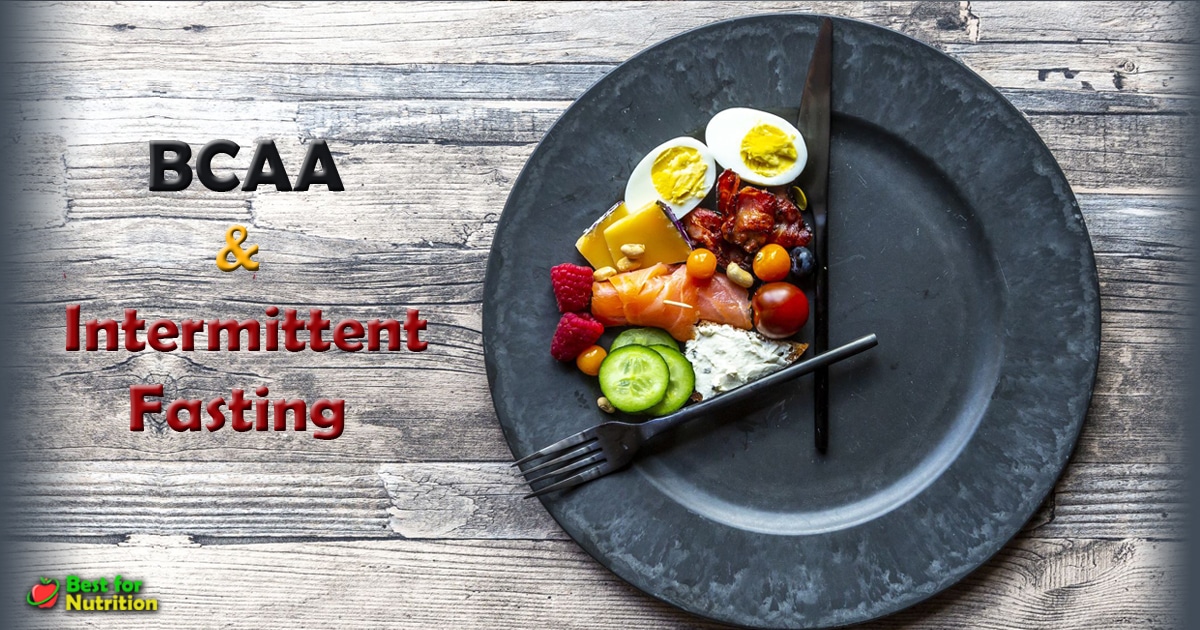Branched-chain amino acid (BCAA) supplements are quite popular among bodybuilders and athletes. They help in building muscles, improving endurance, and reducing muscle fatigue after a workout.
Essential amino acid (EAA) supplements are a new entry into the bodybuilding niche and are now threatening to edge out BCAAs as a better supplement.
EAA contains all the nine essential amino acids while BCAAs contain just three of them. If you think that makes EAAs the clear winner, you need to think again!
BCAA supplements do have certain advantages over EAAs. So read on to find out who really wins this battle among bodybuilding supplements.
- What are Essential Amino Acids (EAAs)?
- What is BCAA?
- Why Use BCAA or EAA Supplements?
- Why BCAAs are More Popular than EAAs
- BCAA vs EAA – What the Research Says
- EAA vs BCAA: The Winner
- FAQs

What are Essential Amino Acids (EAAs)?
Amino acids are the building blocks of protein. 20 different amino acids are used to create protein in the human body. 11 of these amino acids can be produced by the body and are known as non-essential amino acids (1).
The remaining 9 are considered essential amino acids (EAA) and have to be obtained from our diet. These are isoleucine, leucine, valine, lysine, methionine, phenylalanine, threonine, histidine, and tryptophan.
These are absolutely essential for sustaining our life functions. If we don’t get it, we won’t survive. Hence, the name “essential amino acids” (2).
Essential amino acids can be easily obtained from natural protein sources such as meat, eggs, poultry, beans and lentils, whole wheat, and nuts (3).
Summary: The 9 amino acids that need to be obtained from food are essential amino acids. Animal protein, beans, lentils, and nuts are good sources of them.
What is BCAA?
BCAA (branched-chain amino acids) are a combination of the 3 essential amino acids leucine, isoleucine, and valine (4).
35-40 percent of the essential amino acids that are present in our body are BCAAs and 14-18 percent of the essential amino acids in our muscles are BCAAs (5).
Taken in addition to a balanced diet, BCAA supplements increase endurance, improve performance, reduce DOMS, and aid protein synthesis. They can be taken before, during, or after your workouts, depending on the timing, duration, and intensity of your workouts.
Summary: The three essential amino acids, leucine, isoleucine, and valine are BCAAs. They are excellent workout supplements that aid in muscle protein synthesis and help recover faster post-workout.
Why Use BCAA or EAA Supplements?
Both BCAAs and EAAs can be obtained from our diet. For most people, there is no reason for additional supplement intake. But yet, many of us struggle to eat enough healthy food to meet our amino acid needs.
Animal-based proteins such as meat and dairy are considered the richest source of EAAs, while most plant proteins are lacking in one or more of the EAAs. Vegans and vegetarians may find it easier to take protein supplements to their daily protein requirements (6).
Bodybuilders and fitness enthusiasts have an increased need for protein to train intensely or for building more muscles. Meeting their protein requirement on a daily basis is much easier with a supplement.
Summary: People who can’t meet their protein requirements through diet; people whose protein requirement increases because of intense training; should go for supplements to meet their needs.
Why BCAAs are More Popular than EAAs
Unlike other amino acids that are metabolized in the liver, BCAAs are broken down in the muscles. This unique property gives them the edge over other amino acids and makes them important in instant energy production during exercise (7).
Leucine in BCAAs has the strongest impact on your body’s capacity to build muscle proteins (8). Isoleucine and valine of the BCAAs produce energy and regulate blood sugar levels (9).
BCAAs play several crucial roles in our bodies.
- Being amino acids, they can be used as building blocks for protein and muscle (10).
- BCAA increases muscle mass by activating the enzymes that are responsible for building muscles (11).
- They help in regulating blood sugar levels. They can preserve liver and muscle stores and stimulate the cells to take in sugar from the bloodstream. Isoleucine and valine have been found to increase insulin secretion and boost the muscles to take in more sugar from the blood (12).
- During exercise, amino acid tryptophan increases in your brain. This is converted to serotonin, which is a brain chemical that is responsible for exercise fatigue. BCAA can help reduce this by keeping their levels low (13).
- BCAA also helps decrease muscle soreness after an intense workout. During exercise/workout, especially if you are new to it, it is normal to feel muscle soreness 24-48 hours after your workout. Commonly known as delayed onset of muscle soreness (DOMS), can last up to 72 hours (14).
- BCAA boosts weight loss, by enhancing fat loss and preventing weight gain (15).
Summary: EAAs provide you with all the essential amino acids that the body needs, which also includes the three BCAAs. They are the right choice to supplement your body’s need if it does not have sufficient protein. However, if you are having a healthy diet, BCAAs are better for your muscle-building fitness regime.
BCAA vs EAA – What the Research Says
BCAA supplements have varying ratios of leucine, isoleucine, and valine. Normally it is 2:1:1 but 4:1:1 and 8:1:1 is also seen in some blends.
EAAs are in comparison, have all the 9 amino acids that are essential for metabolic functions in the body, including the 3 BCAAs.
Research on the efficacy of taking EAAs or BCAAs only has put forward the points that will clearly clarify which of them is needed more and when.
Depends Upon Your Protein Intake
Some studies state that both BCAA and EAA supplements support muscle growth and recovery after training, but BCAAs are better suited for people who have already been able to meet their daily protein needs (16, 17).
However, people who fall short of their daily needs will gain more with EAA supplements. In accordance with the International Society of Sports Nutrition, active adults need 1.4-2.2 grams of protein per kg body weight per day (18).
For a 150 pound person, it ranges between 95-136 grams. If you are getting that amount of protein from food, and only need supplements for supporting your muscles during workout, the BCAA supplement is your answer.
But, if you get less than 1.4 grams of protein per kilogram of your body weight, BCAA alone won’t do and you must go for an EAA supplement.
Summary: BCAA is the right option for people who have met the EAA need of the body and want an extra supplement to support workout. In case, your diet is deficient in protein, then the need for EAA increases more than BCAA, and that’s the supplement you should go for.
Depends Upon Your Workout Regime
Some amino acids are of course sent to the liver to act as a fuel to produce energy that is needed during weight training. Some are recycled and used to produce new proteins. This protein turnover must happen for muscle growth to occur (19).
But, when BCAA is taken alone, the full spectrum of amino acids is not available for the new protein synthesis and may hamper the process.
A detailed explanation of BCAAs and EAAs are done in a 2017 study (20). The researchers noted that the muscles turn into a receptive mode for amino acids until 48 hours post-workout. Hence, the need for an amino acid supplement intra or post-workout for fitness enthusiasts (21).
A study that was published recently in the Frontiers in Physiology found that ingesting 5-6 grams of BCAAs after a strength training session leads to greater muscle protein synthesis (22).
However, in the Journal of the International Society of Nutrition, a review was done and it was seen that muscle synthesis post-workout needed an abundant supply of all the EAAS and not only BCAAS (23).
Summary: After an intense workout, when new muscle protein synthesis occurs, EAA gives you a better array of required amino acids than a BCAA supplement alone. If you prefer to take a BCAA supplement, then make sure to include more protein-rich foods in your diet.
Depends Upon Your Post-workout Recovery Rate
EAA is primarily responsible for amino acid-induced stimulation of muscle protein synthesis. For athletes mainly, this is essential. The quicker you are in the path of recovery, the more progressive you can become (24).
A study showed that non-frail adults, undergoing AE training increased walking speed and aerobic fitness and when combined with EAA supplements, increased muscle strength and EAA stimulated protein synthesis (25).
In a study conducted in 2016, by Moberg et.al, the effect of water, leucine, BCAAs, and all EAAs in resistance-trained men competing for a training protocol compared, it was observed that the BCAA intake group stimulated muscle protein synthesis by 22 % more as compared to the water group (26).
Taking BCAA pre-workout and intra-workout has a muscle sparing effect. It prevents muscle loss. That was very impressive but when it was compared with the EAA group, the latter improved nearly double than BCAAs.
Summary: When it comes to muscle protein synthesis after a strenuous workout, even though BCAA supplements have shown an impressive positive effect, EAA’s benefits are much more.
EAA vs BCAA: The Winner
EAA supplements are premium versions of the BCAA supplements. They contain all the essential amino acids including the three BCAAs. However, amongst all the amino acids present, the concentration of BCAAs is the most.
This is mainly because of the crucial role that BCAAs play in muscle synthesis.
In the three BCAAs, leucine is the most effective amino acid, hence its concentration is important. Even though EAA supplements have leucine, BCAA supplements have more.
A single serving of a BCAA supplement provides around 3000-3500mg of leucine while EAAs have less of this in comparison. Therefore, if your focus is muscle building and the extra power to boost your workout, BCAAs are for you. It works extremely well provided you are getting sufficient protein from your food.
But, if your body doesn’t have sufficient protein intake, then EAA supplements are the right choice, as it helps you reach your goal by filling the nutritional gaps. This ensures that your body has all the amino acids needed for new muscle protein synthesis.
Summary: EAA supplements have all the 9 essential amino acids including the three BCAAs. However, the concentration of leucine is higher in BCAA supplements than EAA supplements. BCAA is more effective if you can meet your protein requirements through diet and need a supplement to boost your muscle building effort.
FAQs
When is the Right Time to Take BCAAs and EAAs?
Studies show that the net muscle protein synthesis increases most when BCAAs and EAAs are consumed during the body’s most receptive phase (27).
It usually starts 30-60 minutes post-exercise and can stretch to 24-48 hours. This is mainly because of the increased amino acid delivery and absorption in exercising skeletal muscle.
When Should You Take EAA and What Should be the Dosage?
As a dietary supplement, 10-15 grams per 100 pounds of body weight per day is good enough (28).
10g of EAA supplement during a workout provides anabolic support for recovery. If you are taking it post-workout, EAA supports post-workout anabolism.
The Final Note
When you do not get sufficient protein through food to reach your goal, supplements help you fill up those nutritional gaps. Both BCAA and EAA supplements are beneficial in their own way, depending upon your body’s needs.
They help you reach your goal of protein synthesis post-workout, boost performance, and help recover in a sustained way.
If your body is consuming enough protein through food and you want something extra to support your workout, BCAA supplements are the right choice. They are extremely effective in intense muscle building days.
However, if your body is deficient in certain amino acids, the EAA supplement is a better choice. It not only includes all three BCAAs but also other amino acids too, that should be present for optimal results.





